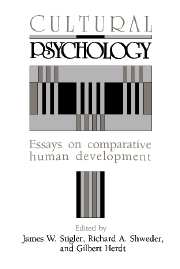Book contents
- Frontmatter
- Contents
- Preface
- Cultural psychology – what is it?
- Part I The keynote address
- Part II Cultural cognition
- Part III Cultural learning
- 6 The socialization of cognition
- 7 Indexicality and socialization
- 8 The culture of acquisition and the practice of understanding
- 9 Mathematics learning in Japanese, Chinese, and American classrooms
- Part IV Cultural selves
- Part V Cultural conceptions of psychoanalysis
- Part VI Cultural domination and dominions
- Part VII A skeptical reflection
- List of conference participants
- Name index
- Subject index
8 - The culture of acquisition and the practice of understanding
Published online by Cambridge University Press: 05 June 2012
- Frontmatter
- Contents
- Preface
- Cultural psychology – what is it?
- Part I The keynote address
- Part II Cultural cognition
- Part III Cultural learning
- 6 The socialization of cognition
- 7 Indexicality and socialization
- 8 The culture of acquisition and the practice of understanding
- 9 Mathematics learning in Japanese, Chinese, and American classrooms
- Part IV Cultural selves
- Part V Cultural conceptions of psychoanalysis
- Part VI Cultural domination and dominions
- Part VII A skeptical reflection
- List of conference participants
- Name index
- Subject index
Summary
When I began research on craft apprenticeship among Vai and Gola tailors in Liberia 15 years ago, the community of scholars who worked on cross-cultural comparative studies of education and cognitive development had definite opinions about “informal education.” Learning through apprenticeship was assumed to be concrete, context-embedded, intuitive, limited in the scope of its application, mechanical, rote, imitative, not creative or innovative – and out of date. Views have changed. There is considerable interest, currently, in situated learning, embodied knowledge, and the mutual constitution of the person and the lived-in world. The math-learning research community, which certainly claims a stake in debates about crucial forms of thinking and knowing, has begun to explore apprenticeship learning, or “the new cognitive apprenticeship.” By this they mean that it might be possible to learn math by doing what mathematicians do, by engaging in the structure-finding activities and mathematical argumentation typical of good mathematical practice (e.g., Brown, Collins, and Newman, in press; Schoenfeld, 1985). They emphasize the situated character of problem-solving activity while focusing on learning in doing. There is agreement, then, about the situated character of learning and knowing in apprenticeship, while the significance of this fact has become subject to quite different valuation over time. Indeed, those same math-learning researchers are likely to describe conventional school math learning as the all too mechanical transmission of a collection of facts to be learned by rote, a process devoid of creative contributions by the learner.
- Type
- Chapter
- Information
- Cultural PsychologyEssays on Comparative Human Development, pp. 309 - 327Publisher: Cambridge University PressPrint publication year: 1990
- 108
- Cited by

